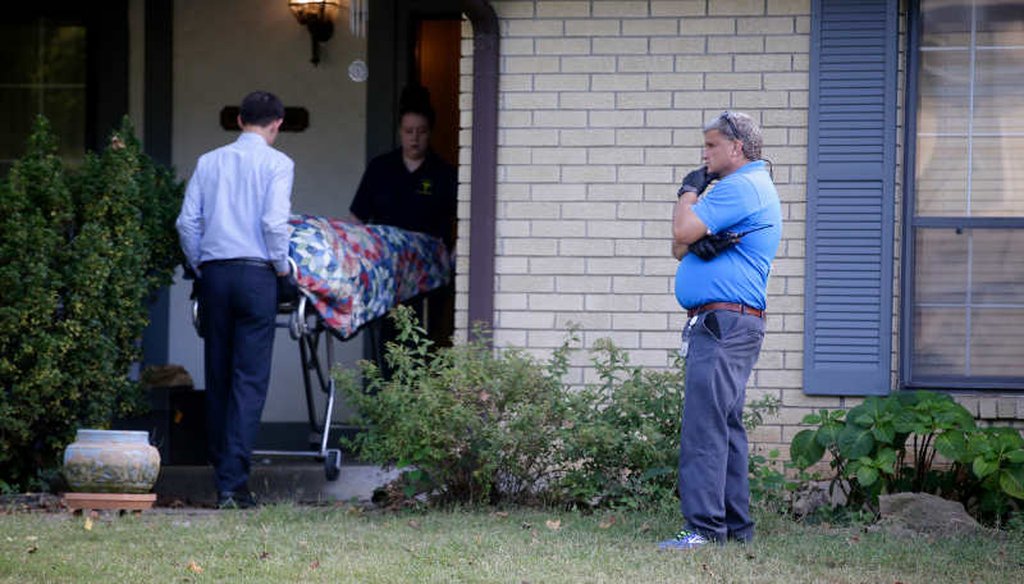Stand up for the facts!
Our only agenda is to publish the truth so you can be an informed participant in democracy.
We need your help.
I would like to contribute

Tulsa Police Sgt. David Walker, right, on the scene of a South Tulsa homicide where a father was reportedly shot in front if his children Oct. 1, 2017. (Mike Simons/Tulsa World)
A key thread in the immigration debate involves crimes committed by people in the country illegally. On KRMG radio, host Rick Couri asked Tulsa Sgt. David Walker, "How many of the murders you’ve solved have been illegal aliens, or have they been mostly just folks from here?"
Walker heads the city’s homicide division and has a reputation for solving a high percentage of cases.
"I would say in the last three or four years, we are seeing an increase," Walker said March 9. "So I don’t know what could be the cause of that. It could be the heroin traffic. It could be the cartels coming in and actually making Tulsa a place where they want to stop. But I have seen more in the last three or four years."
A listener contacted us saying it sounded as though Walker had said that most of the murders were committed by immigrants in the country illegally.
We asked Walker, and he offered an emphatic correction.
"That is not to be understood as most of our murders are committed by Mexican nationals," he said. "That is not accurate at all."
Walker sent us this table based on the records he’s kept for the past five years.
Year
Total of Tulsa murders
Murders by non-citizens
2013
66
0
2014
55
0
2015
58
1 with 2 defendants
2016
82
2
2017
82
2
2018
6
1
So an increase from no murders in 2014 to one case in 2015 and two cases in 2016 and 2017 is an increase. But the percentage of these defendants has dropped, according to city records. In 2015, it was 3 percent of all murders. In 2016 and 2017, it was 2 percent.
But just so we don’t lose track of Couri’s question, Walker spoke of Mexican nationals – who might or might not be in the country illegally – and that group commits a small fraction of murders in Tulsa, about 2.5 percent.
Criminologist Trina Hope at the University of Oklahoma said the shift from past years means little. The numbers, Hope said, are just too small to reveal much.
"Crime is caused by a lot of complex things happening at once," Hope said. "People will say, ‘It’s this.’ But when you look closer, there’s no connection."
If the numbers show anything, it is that Tulsa saw about 20 more murders a year after 2015.
According to data from Walker, altercations — that is, heated arguments that turned violent — accounted for most of the increase. Domestic homicides also contributed to the rise. Drug- and gang-related murders did not.
The Tulsa Police Department and Hope said there’s no clear explanation for the increase. Hope added that while a rise of 20 murders per year might catch our attention, it can be deceptive.
"When you start from small numbers, any increase looks dramatic," she said.
As they have since 2013, she noted, the totals can go up and down from year to year.
Our Sources
KRMG, Lead homicide Sgt. Dave Walker, March 9, 2018
The Frontier, Another rise in violent crime in Tulsa in 2016, Jan. 10, 2017
Email interview, David Walker, head of homicide unit, Tulsa Police Department, March 16, 2018
Interview, Trina Hope, associate professor, Sociology Department, University of Oklahoma, March 15, 2016




















































